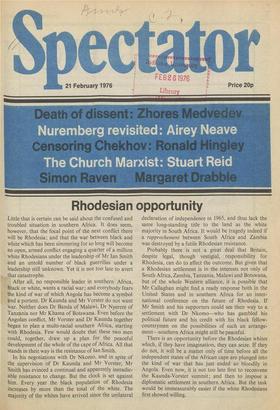Rhodesian opportunity
Little that is certain can be said about the confused and troubled situation in southern Africa. It does seem, however, that the focal point of the next conflict there will be Rhodesia; and that the war between black and white which has been simmering for so long will become an open, armed conflict engaging a quarter of a million white Rhodesians under the leadership of Mr Ian Smith .and an untold number of black guerrillas under a leadership still unknown. Yet it is not too late to avert that catastrophe.
After all, no responsible leader in southern Africa, black or white, wants a racial war; and everybody fears the kind of war of which Angola has become a symbol and a portent. Dr Kaunda and Mr Vorster do not want war. Neither does Dr Banda of Malawi, Dr Nyerere of Tanzania nor Mr Khama of Botswana. Even before the Angolan conflict, Mr Vorster and Dr Kaunda together began to plan a multi-racial southern Africa, starting with Rhodesia. Few would doubt that these two men could, together, draw up a plan for the peaceful development of the whole of the cape of Africa. All that stands in theit way is the resistance of Ian Smith.
In his negotiations with Dr Nkomo, and in spite of the supervision of Dr Kaunda and Mr Vorster, Mr Smith has evinced a continual and apparently ineradicable resistance to change. But the clock is set against him. Every year the black population of Rhodesia increases by more than the total of the white. The majority of the whites have arrived since the unilateral declaration of independence in 1965, and thus lack the same long-standing title to the land as the white majority in South Africa. It would be tragedy indeed if a rapprochement between South Africa and Zambia was destroyed by a futile Rhodesian resistance.
Probably there is not a great deal that Britain, despite legal, though vestigial, responsibility for Rhodesia, can do to affect the outcome. But given that a Rhodesian settlement is in the interests not only of South Africa, Zambia, Tanzania, Malawi and Botswana, but of the whole Western alliance, it is possible that Mr Callaghan might find a ready response both in the United States and in southern Africa for an international conference on the future of Rhodesia. If Mr Smith and his supporters could see their way to a settlement with Dr Nkomo—who has gambled his political future and his credit with his black fellowcountrymen on the possibilities of such an arrangement—southern Africa might still be peaceful.
There is an opportunity before the Rhodesian whites which, if they have imagination, they can seize. If they do not, it will be a matter only of time before all the independent states of the African cape are plunged into the kind of war that has just ended so bloodily in Angola. Even now, it is not too late first to reconvene the Kaunda-Vorster summit; and then to impose a diplomatic settlement in southern Africa. But the task would be immeasurably easier if the white Rhodesians first showed willing.


































